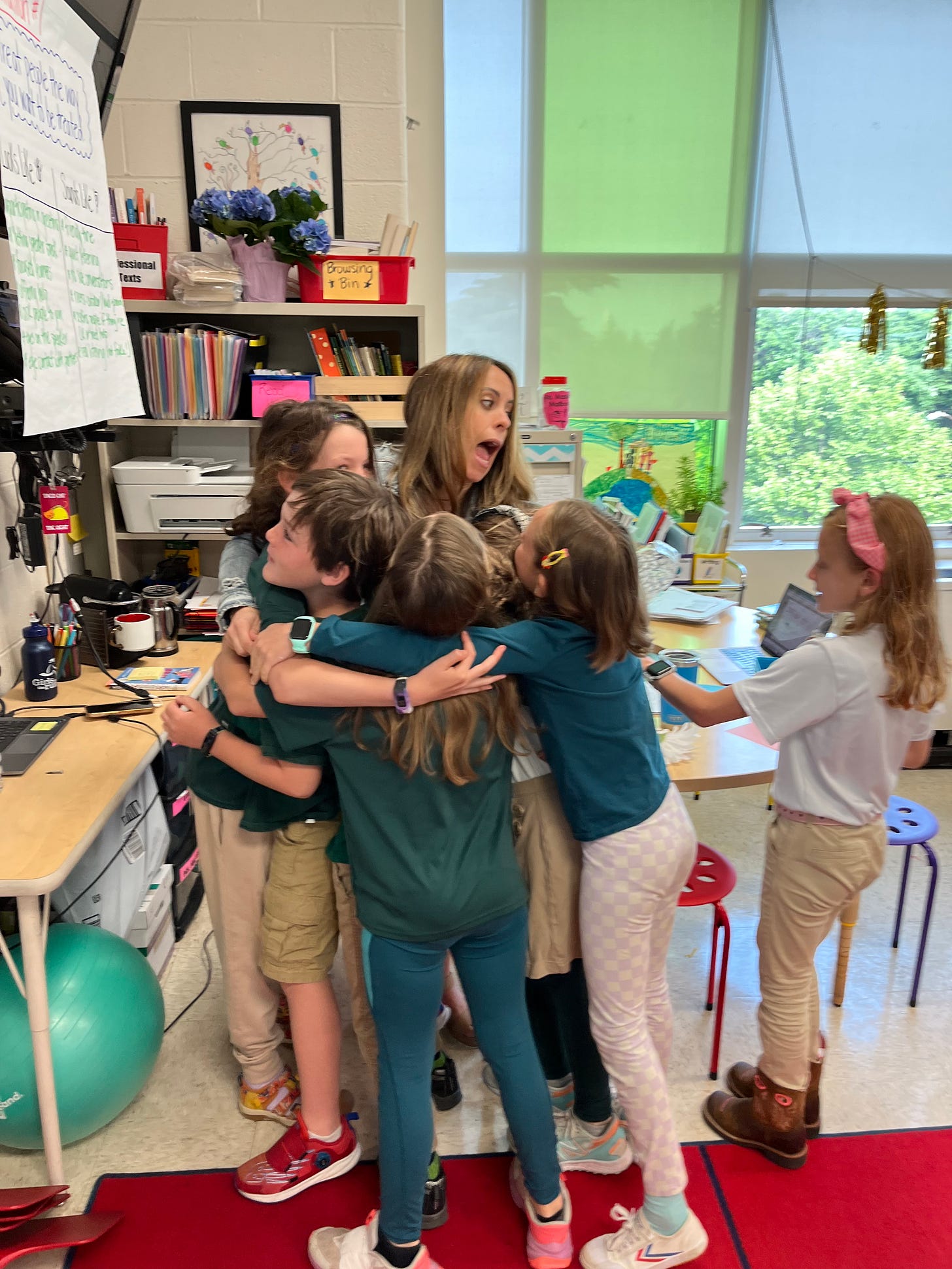Teacher Appreciation That Counts
Spoiler: It's not a week. It's a mindset. But I've still got some gift ideas.
It’s been a week. One full of late night cramming sessions around the dining room table with my son, re-learning how to solve radical equations and exploring the causes of the Industrial Revolution because middle school. And report card season. And, ahem, procrastination.
Allow me to put to rest any notion that teachers who are also parents have an edge when it comes to ushering their own children through school. While there are certainly some pros, we’re about as effective as any other parent when it comes to motivating our offspring. Which is to say, we’re useless.
As I file this week under the category of SURVIVING THE TEENAGE YEARS, I’m reminded how critical it is to take 360-degree perspectives, especially in matters involving school.

Back when I was a brand-new teacher, I thought I understood a thing or two about parents and what they want from their kid’s teacher: timely, well-crafted communication, evident knowledge of the content, professionalism, etc.
When I became a parent, I discovered that while my list wasn’t incorrect - parents do appreciate those items! - it also wasn’t complete. The thing parents desire most is the hardest thing for any teacher to deliver: They want you to understand their child. The quirks, the talents, the hidden behaviors, the triggers and motivators, the things make them them. And, ideally, they want you to love those things as much as they do.
There are familiar reasons why such a simple task is also such a tall order: large class sizes, unreasonable demands on teachers’ time, competing distractions, etc. It’s all part and parcel of the current education system (at least we’ve allowed it to be), but as a parent, I recognize how frustrating it can feel when your kid’s needs are not being met. Or when you fear they’re not being seen.
We’re in a tricky moment in the evolution of public education. Underlying many communities are layers of animosity and distrust residual from the pandemic. Teachers are tired. Parents are tired. Budgets are being cut and exhaustive culture wars rage on. More than ever, we need parents united with teachers, fighting for the academic and mental health well-being of our kids. But we’re struggling to achieve a productive dialogue with one another.
The further removed I become from my classroom teaching experience, the more determined I am to retain the mindset of a teacher. Even though it’s been less than a year since I walked away, I’ve found it frighteningly easy to forget what it’s like to stand on the other side of this equation. That’s code for I can be an a-hole, helicopter parent, too.
Man, I wish it wasn’t the case. In an ideal world, one in which I’ve upgraded from human to superhuman, I am a supreme, morally upright advocate for educators everywhere. Instead, I must settle for being a flawed, occasionally hypocritical human. Still, I hope to offer a little perspective that bridges understanding between parents and teachers. And there’s no better time of the year to attempt such dialogue than Teacher Appreciation Week.

A history, for starters: Teacher Appreciation Week was first introduced by former First Lady Eleanor Roosevelt in 1953 as a single day. Decades later, it morphed into its current form of a whole week. This year it falls during the week of May 6th, which, in the event that your house is running on frantic get-me-to-summer fumes, is your friendly reminder to add it to the calendar for next week.
A caveat, if I may.
The point of Teacher Appreciation Week is not to stress out already overworked parents by forcing them out of bed an hour early to procure Starbucks gift cards. In any gift-giving exchange, it’s the thought that counts. And genuine thought does not simply take the form of a hasty gift card (although, please do still buy that Starbucks card; I don’t know a single teacher who doesn’t appreciate a free caffeine boost). It’s about something more.
Appreciation is about reflection. And reflection is often about seeing the world through a different set of eyes. Another word for which is empathy.
Sometimes empathy looks like offering help: volunteering at school, working with small groups, pre-cutting tedious craft projects, or organizing the classroom library.
Sometimes empathy is allowing a few extra days before expecting an email response. Or not sending the email at all.
Sometimes empathy is remembering that our kids don’t report 100% truth to us at the end of each school day (case in point: my daughter recently told our neighbor I’d been bitten by the rabid fox that roamed loose at the Capitol. The facts here were highly distorted). So, we’d be wise to take a beat before nosing ourselves into battle without the facts.
Empathy is remembering that your kids’ teachers have their own families, their own sick parents and kids, their own sinkfuls of dirty dishes, their own medical appointments, and life milestones. Teaching is their job, not their life.
Empathy is remembering that if your kid occasionally drives you nuts, they occasionally drive their teachers nuts too.
Empathy is also an extension of trust: Trust that your kids’ educators want them to succeed. Trust in their professional expertise (sorry to report that lawyers are not teachers, even if many have valiantly attempted to tell us how to do our jobs).
Lastly, empathy is about remembering that there is more than one perspective out there. And that every perspective is valid.
Ultimately, teacher appreciation isn’t just a week of gift-giving. It’s a mindset, one in which we approach educators with empathy, patience, curiosity, and trust, especially in the moments we’re at odds. The invisible labor of an educator is worthy of our deepest appreciation.
Gift Ideas That Hit the Mark
Some schools have unique precedents when it comes to gift-giving. At my daughter’s school, for example, each day of Teacher Appreciation Week has a theme: a handwritten letter, flowers, staff breakfast, etc. This can be a smart way of establishing spending equity within a community.
If you’re looking for something a little extra, however, I invite you to think outside the traditional notepads, coffee mugs, and school supplies. While it’s lovely to be rich in rubber stamps, the best gifts communicate that you see your child’s teacher as a person, not just a person desperate for pencils.
I love this Reddit conversation about the gifts that have been most appreciated by educators. Among the winners,
Handwritten notes
Money
Gift cards (gas, grocery stores, Amazon, Target)
Lots of repetition in these posts about the abundance of lotions, candles, mugs, so consider staying away from these frequently received items. Or enjoy a few laughs reading about these worst appreciation gifts.
My personal favorites over the years have included the following,
Homemade, non-rushed cards from the kids in which they apply the rules of grammar and spelling (ha!)
Lunch delivered to my classroom from a local restaurant
Loungewear (I live for sweatshirts and frequently ended the school day in a pair of Vuori joggers and a sweatshirt)
Gift cards to my local bookstore
Gift cards to my favorite store-stores (Anthropologie, Sephora, Zara)
Homemade cookie deliveries to my front door
P.S. And if rubber stamps are defiantly your love language, consider these personalized ones. My former co-teacher has one with her face on it and it provided us with endless laughs.





At the end of every year, I wrote personalized thank you emails to teachers who were especially influential or went above and beyond in some way. I highlighted something (or several things) specific to my child. And I sent it along with -- and this was key -- a cc: to the principal and superintendent because I wanted them to know how much that teacher impacted and supported our family. Hopefully these notes and recognition were appreciated! :)
Empathy - a much needed quality these days! As a former high school teacher (5 years) and parent (of now adult children), I hear you! Thanks for your insights.